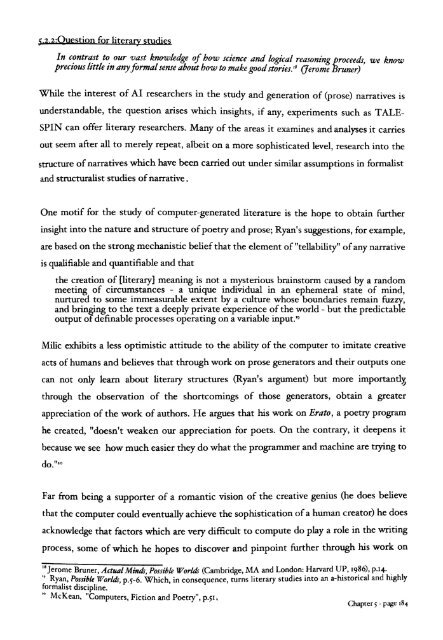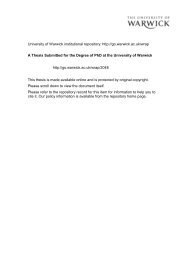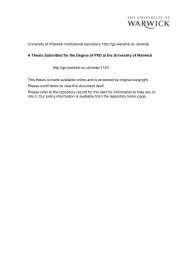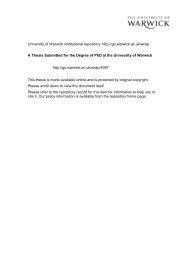From Page to Screen - WRAP: Warwick Research Archive Portal ...
From Page to Screen - WRAP: Warwick Research Archive Portal ...
From Page to Screen - WRAP: Warwick Research Archive Portal ...
You also want an ePaper? Increase the reach of your titles
YUMPU automatically turns print PDFs into web optimized ePapers that Google loves.
5,2,2:QuestiQn fQr literary studi,.§,<br />
In c?ntra,st <strong>to</strong>.. our vast knowledge ofhow science and logical reasoning proceeds, we know<br />
precious little In anyformalsense about how <strong>to</strong> makegoods<strong>to</strong>ries.18 (Jerome Bruner)<br />
While the interest of AI researchers in the study and generatiQn of (prose) narratives is<br />
understandable, the question arises which insights, if any, experiments such as T ALE<br />
SPIN can offer literary researchers, Many of the areas it examines and analyses it carries<br />
out seem after all <strong>to</strong> merely repeat, albeit on a more sophisticated level, research in<strong>to</strong> the<br />
structure ofnarratives which have been carried out under similar assumptions in formalist<br />
and structuralist studies ofnarrative.<br />
One motif for the study of computer-generated literature is the hope <strong>to</strong> obtain further<br />
insight in<strong>to</strong> the nature and structure ofpQetry and prose; Ryan's suggestions, for example,<br />
are based on the strong mechanistic beliefthat the element of"tellability" ofany narrative<br />
is qualifiable and quantifiable and that<br />
the creation of {literary} meaning is not a mysterious brains<strong>to</strong>rm caused by a random<br />
meeting of circumstances - a unique individual in an ephemeral state of mind,<br />
nurtured <strong>to</strong> some immeasurable extent by a culture whose boundaries remain fuzzy,<br />
and bringing <strong>to</strong> the text a deeply private experience ofthe world - but the predictable<br />
output ofdefinable prQcesses operating on a variable input.v<br />
Millc exhibits a less optimistic attitude <strong>to</strong> the ability of the computer <strong>to</strong> imitate creative<br />
acts of humans and believes that through work on prQse genera<strong>to</strong>rs and their outputs one<br />
can not only learn about literary structures (Ryan's argument) but more impQrtantl:g<br />
through the observation of the shortcomings of those genera<strong>to</strong>rs, obtain a greater<br />
appreciation Qf the work of authors. He argues that his work on Era<strong>to</strong>, a poetry prQgram<br />
he created, "doesn't weaken our appreciation for poets. On the contrary, it deepens it<br />
because we see hQW much easier they do what the prQgrammer and machine are trying <strong>to</strong><br />
dQ,"ZO<br />
Far from being a supporter of a romantic vision of the creative genius (he does believe<br />
that the computer could eventually achieve the sophistication ofa human crea<strong>to</strong>r) he does<br />
acknowledge that fac<strong>to</strong>rs which are very difficult <strong>to</strong> compute do playa role in the writing<br />
process, some of which he hopes tQ discover and pinpoint further through his work on<br />
18Jerome Bruner, Actual Minds, Possible Worlds (Cambridge, MA and London: Harvard UP, 1986), P·14, .<br />
'9 Ryan, Possible Worlds, P.5-6, Which, in consequence, turns literary studies in<strong>to</strong> an a-his<strong>to</strong>rical and highly<br />
formalist discipline,<br />
10 McKean, "Computers, Fiction and Poetry", P,51 •<br />
Chapter 5 - page 184





